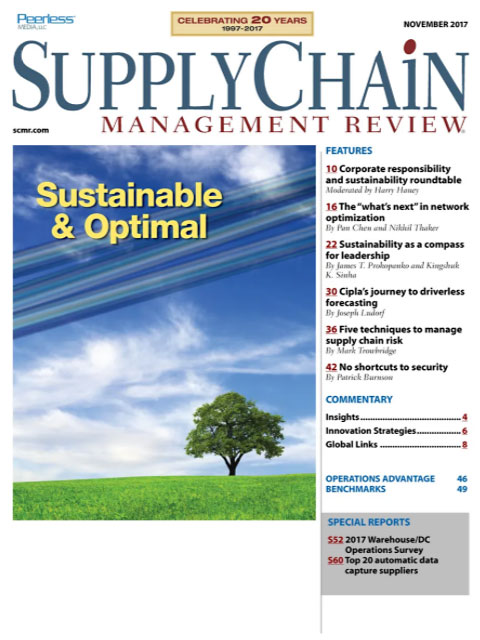Sorry, but your login has failed. Please recheck your login information and resubmit. If your subscription has expired, renew here.
November 2017
There are strands of sustainability and corporate responsibility through much of this month’s issue. James T. Prokopanko, the former CEO and president of The Mosaic Company, details how corporate responsibility became his compass for leader ship when he took over the reins of the company back in 2007. Similarly, Joseph Ludorf, the executive director of supply chain for Cipla Medpro, details how revamping the planning process enables the South African pharmaceutical company to prof- itably supply drugs to underserved populations on the continent as part of its corporate mission. We round out the issue with five tips for intelli- gent risk taking in… Browse this issue archive.Need Help? Contact customer service 847-559-7581 More options
Leading an organization today requires navigating the pushes and pulls of multiple stakeholders: generating shareholder returns, delivering value to customers, recruiting and engaging a talented work force and being socially and environmentally responsible to name just a few top-of-mind demands. The leaders of The Mosaic Company—the world’s largest combined producer of potash and phosphate fertilizer faced many serious challenges when it was founded in 2004.
By the time James Prokopanko, one of the authors of this article, assumed the reins as chief executive officer and president in 2007, it was burdened with excessive debt; the prices of the products it produced and sold were at break-even or close to cost of production; its customers—the world’s farmers—were struggling financially; the company’s cash flow was the cause of sleepless nights for the CFO; safety performance was not what its employees deserved; and the company’s operational performance was nothing to boast about. That the company was beset with a barge load of problems was an understatement. In this environment, sustainability was nowhere near the top of the company’s “worry list.”
Since those early years, Mosaic has found its footing and has emerged as a growing, financially-sound enterprise with engaged employees making a remarkable positive difference to many lives around the world—an organization that is strong, resilient and enduring—a truly sustainable enterprise.
What makes Mosaic’s journey remarkable and unique is that it is substantively grounded in:
- the learnings around the notion of “sustainability” and the importance of developing a clear understanding of this important word; and
- the idea that a clearly defined, broad and inclusive understanding of “sustainability” can serve as a valuable compass to help leaders navigate the increasing challenges and vagaries of an ever more inter-dependent global economy.

This complete article is available to subscribers only.
Log in now for full access or start your PLUS+ subscription for instant access.
SC
MR
Sorry, but your login has failed. Please recheck your login information and resubmit. If your subscription has expired, renew here.
November 2017
There are strands of sustainability and corporate responsibility through much of this month’s issue. James T. Prokopanko, the former CEO and president of The Mosaic Company, details how corporate responsibility… Browse this issue archive. Download a PDF file of the November 2017 issue.Leading an organization today requires navigating the pushes and pulls of multiple stakeholders: generating shareholder returns, delivering value to customers, recruiting and engaging a talented work force and being socially and environmentally responsible to name just a few top-of-mind demands. The leaders of The Mosaic Company—the world's largest combined producer of potash and phosphate fertilizer faced many serious challenges when it was founded in 2004.
By the time James Prokopanko, one of the authors of this article, assumed the reins as chief executive officer and president in 2007, it was burdened with excessive debt; the prices of the products it produced and sold were at break-even or close to cost of production; its customers—the world's farmers—were struggling financially; the company's cash flow was the cause of sleepless nights for the CFO; safety performance was not what its employees deserved; and the company's operational performance was nothing to boast about. That the company was beset with a barge load of problems was an understatement. In this environment, sustainability was nowhere near the top of the company's “worry list.”
Since those early years, Mosaic has found its footing and has emerged as a growing, financially-sound enterprise with engaged employees making a remarkable positive difference to many lives around the world—an organization that is strong, resilient and enduring—a truly sustainable enterprise.
What makes Mosaic's journey remarkable and unique is that it is substantively grounded in:
- the learnings around the notion of “sustainability” and the importance of developing a clear understanding of this important word; and
- the idea that a clearly defined, broad and inclusive understanding of “sustainability” can serve as a valuable compass to help leaders navigate the increasing challenges and vagaries of an ever more inter-dependent global economy.
SC
MR


Latest Supply Chain News
- How CPG brands can deliver on supplier diversity promises
- How S&OP provides the answer to in-demand products
- AI, virtual reality is bringing experiential learning into the modern age
- Humanoid robots’ place in an intralogistics smart robot strategy
- Tips for CIOs to overcome technology talent acquisition troubles
- More News
Latest Podcast

 Explore
Explore
Procurement & Sourcing News
- How CPG brands can deliver on supplier diversity promises
- How S&OP provides the answer to in-demand products
- There is still work to do to achieve supply chain stability
- Blooming success: The vital role of S&OE in nurturing global supply chains
- How one small part held up shipments of thousands of autos
- Shining light on procurement’s dark purchases problem
- More Procurement & Sourcing
Latest Procurement & Sourcing Resources

Subscribe

Supply Chain Management Review delivers the best industry content.

Editors’ Picks







